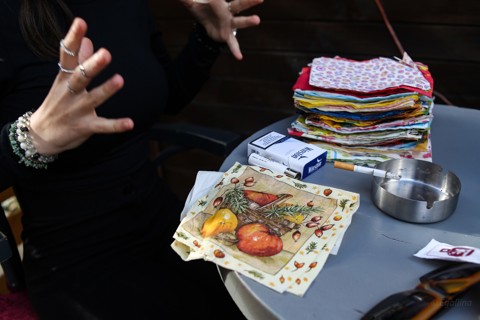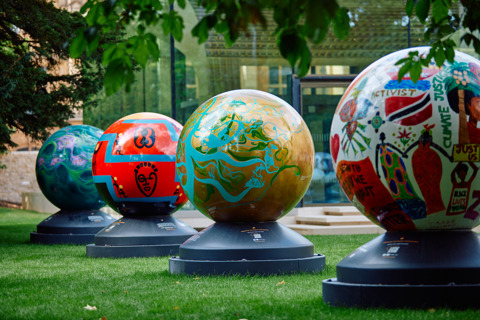
The past decade in southern Africa has borne witness to an unprecedented ideological shift. Three interlinked movements, Rhodes Must Fall, Fees Must Fall and Black Lives Matter, have reframed the ways in which many of us think and speak about our cultural and educational traditions and their symbols, calling on us to recognise the ongoing impact of colonial history. In turn, local and global debates about monuments and memorialisation have multiplied.
Through a selection of artworks produced since Rhodes Must Fall, the exhibition Entangled takes an intimate look at how artists in South Africa, Namibia and Zimbabwe have grappled with colonial legacies, their material manifestations and visual symbolism.
Both Nicola Brandt’s own artworks and her collaboration with Gift Uzera and Muningandu Hoveka create a link between Namibia’s colonial past (first as a German colony and later occupied by South Africa), and the spectres of Rhodes that exist in several places in South Africa, Zimbabwe and the United Kingdom. Here the relationship between empire and ecology also comes into view.
Rhodes’ enduring presence is visible in Raymond Fuyana’s painting, which depicts a memorial to the South African War (1899 - 1902) and reminds us how a small number of men profoundly influenced the aesthetics of colonial memorialisation across countries and continents.
The drawings of Isheanesu Dondo reference Great Zimbabwe and the Zimbabwe Bird as a way of pointing to how these symbols were appropriated into the Freemasons’ visual lexicon in both the colonies and the metropole.

Zenaéca Singh looks at how sugar farming in South Africa, one of the primary undertakings of the British empire, relied on indentured Indian labour, including women. Singh uses as her medium the very output of that labour - sugar.
The presence of collective ancestors resounds in Tuli Mekondjo’s work, which mourns and honours the memory of her Namibian female forebears. She metaphorically stitches together past and present, birth and death, reminding us burial can be followed by resurrection.
As decolonial movements urge us to rethink teaching, learning, knowledge systems and the institutions that uphold them, this exhibition foregrounds the role of contemporary artists in shaping revisionist histories and new ways of knowing.
Browse the catalogue below to discover more about the artists and view the artworks featured in the exhibition.
If you wish to explore the exhibition in person, please join us for Oxfordshire Artweeks on Friday 9th May and Saturday 10th May. Drop in between 10am and 4pm or join a bookable interactive art tour at 11am or 2pm. Alternatively, email us at communications@rhodeshouse.ox.ac.uk to arrange a time to visit.
Floating Garden
Valéria Nascimento
In the vaulted main hall at Rhodes House, where Scholars have met for decades, Valéria has suspended thousands of pieces of porcelain representing botanical elements from Rhodes Scholarship constituencies around the world.

Valéria Nascimento is a Brazilian-born contemporary porcelain artist celebrated for her intricate and delicate porcelain sculptures and installations. Nascimento's works often explore the delicate beauty and fragility of nature, drawing inspiration from flora, fauna, and geological formations. She is renowned for her mastery of porcelain techniques.
Floating Garden has been commissioned for the apse of the main hall in Rhodes House. This area was always intended for a hanging sculpture by the architect, Sir Herbert Baker, but until now, that intention had not been realised. Consisting of over 10,000 handmade pieces of porcelain, hanging on 1000 transparent lines, to give the sensation of ‘floating’, the work has been conceived in dialogue with the Rhodes House Head Gardener, Neil Wigfield.
Conceived on the one hand to connect the interior architecture to the external garden of Rhodes, House, Floating Garden at its core, is a representation of the diversity of the Rhodes Trust scholarship community through the biodiversity of the geographic regions which form its selection constituencies and their national flowers. A collaborative artwork at its heart, it represents also the collaborative relationship between nations.
"I was honoured to be commissioned to create a permanent large scale installation to mark 120 years of Rhodes Scholarships. Following the progressive vision of the Rhodes Trust to transform the space for its community to gather and connect, I created a piece that reflects on nature as a fundamental uniting force. With my ‘Floating Garden’ I aim to conceive a metaphor that through its botanical and ethereal presence connects people, countries and Scholars."
Living with the legacy of Cecil John Rhodes
Professor Shadreck Chirikure
This exhibition is a response to the question: “Cecil John Rhodes: Hero, Villain, Ruthless Exploiter or Unjustly Accused?"

In this exhibition Professor Chirikure reflects through his own photography on some of the conversations he has had with the Rhodes Trust’s Legacy, Equity and Inclusion working groups, and how we think about the turbulent legacy of Cecil Rhodes. This is the first in a series of planned artistic responses to the themes of the Trust’s history and legacy, exploring the impact of extraction in relation to people and nature, and how we might learn from past mistakes, and work towards a decolonised future.
"How can we live with, and amidst, the legacy of Cecil John Rhodes? Should that even be a question? Going to South Africa as a poorly teenager, Mr Rhodes became one of the most influential and richest entrepreneurs on earth.

"His ruthless political ambition and fortune enabled him to expand British imperial interests. Rhodes’ British South Africa Company colonised large parts of southern Africa: Southern Rhodesia (Zimbabwe), northern Rhodesia (Zambia) and Nyasaland (Malawi).
"The two Rhodesias were named after Mr Rhodes, who was also the Premier of the Cape Colony in South Africa. Wars were fought, lands were appropriated, enterprises were built on worker exploitation, extractive industries paid no attention to environmental issues and Cecil John Rhodes’ wealth substantially increased.
"When Rhodes died, he donated large sums of money to philanthropic causes. The Rhodes Trust was born in 1903 and is based at Rhodes House, Oxford. It has been responsible for the education of many people across the world.

"Initially discriminating against women, the Rhodes Trust later became inclusive. The Rhodes Must Fall movement which began in 2015 at the University of Cape Town raised fundamental legacy issues about the Trust and Mr Rhodes himself.
"How can the Rhodes Trust engage with issues of equity and redress? How can reparative actions benefit southern African communities and the environment? How can legacy issues be mobilised to forge a common, equitable, and just future for all?
"The photographs in this exhibition challenge us to think about these issues, reflecting on the positive and the negative, forcing us to think about how we can make the world a ‘more just place’?"
Previous Exhibitions
Çiknia jonë: Our Girlhood, Elena Gallina

Elena Gallina is the Rhodes Trust’s first Artist in Residence. In her exhibition ‘Çiknia jonë: Our Girlhood,’ Gallina examines the Kosovar practice of collecting and trading paper napkins. After Rhodes House, this exhibition will be displayed first in the USA then across Kosovo.
I Am Because We Are, Nicola Green

‘I Am Because We Are’ by contemporary artist Nicola Green celebrates the lives, heritage, and accomplishments of ten Scholars and Fellows from the Rhodes Trust community.
The World Reimagined, Various Artists

18 globes were on display in the gardens of Rhodes House during Summer 2023. The globes shine an unflinching light on challenging parts of our collective history.

